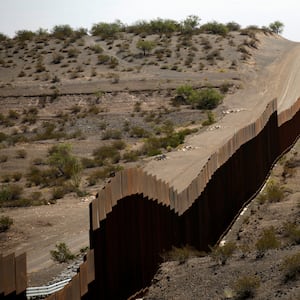In the middle of a pandemic that has killed 27,000 Americans and counting, the Army this week gave a politically connected Montana firm half a billion dollars—not to manufacture ventilators or protective gear to fight the novel coronavirus, but to build 17 miles of President Trump’s southern border wall.
On Tuesday, the Army Corps of Engineers announced it awarded BFBC, an affiliate of Barnard Construction, $569 million in contract modifications for building “17.17 miles” of the wall in two California locations, El Centro and San Diego. That works out to over $33 million per mile—steeply above the $20 million-per-mile average that the Trump administration is already doling out for the wall. Construction is supposed to be completed by the end of June 2021.
And it’s only the latest wall contract the firm has gotten. BFBC, a reliable contributor to Republican politicians, has gotten over $1 billion in taxpayer money in less than a year to build a mere 37 miles worth of wall. Scott Amey, the general counsel at the Project on Government Oversight, urged federal watchdogs to investigate the new BFBC contract.
“$1 billion for 37 miles of wall is a travesty and it must be investigated and audited immediately,” Amey said. “That’s nearly $27 million per mile, which is well above other wall costs. These efforts might make good on a campaign promise, but who is minding the store and ensuring that military readiness and bases are not negatively impacted?”
Last May, when the Corps of Engineers originally awarded BFBC a border-wall contract, it was for $141.8 million—just 25 percent of what BFBC got this week. That contract was for wall construction at El Centro and Yuma, Arizona. Construction was supposed to be completed by the end of January 2020. But the contract quickly swelled, according to federal contracting databases.
The first modification listed in the Federal Procurement Data System contracting database, dated May 20, shows the contract ballooning to $443.6 million. A vague reference to a “supplemental agreement for work within scope” is the only listed explanation. An Army spokesperson confirmed that the El Centro/Yuma contract was “definitized” in September at $440 million, three times the original award’s value.
But in February—well after the CDC identified the first case of COVID-19 in the U.S.—the Army spokesperson continued in a statement to The Daily Beast, the government “requested BFBC design and construct an additional 17.17 miles of border barrier in El Centro and San Diego, CA.” Its explanation for the no-bid contract is that BFBC was already “mobilized and working… in close proximity” to where it wanted to build more of the wall. It gave BFBC the additional $569 million on Apr. 11.
“Pushing more money out the door for border-wall construction while COVID-19 puts the country into economic arrest reflects dubious priorities,” said Laura Peterson, a former staffer on the Senate homeland-security committee who’s scrutinized border-security contracting.
BFBC was one of 12 firms the Army selected in May 2019 to bid on border-wall contracts worth up to $5 billion. The Pentagon’s inspector general opened an investigation in December into another of those firms, Fisher Sand and Gravel of North Dakota, on whose behalf Trump personally lobbied the Army Corps of Engineers. That contract was for $400 million to build 31 miles of the wall around Yuma, a relative steal.
Whatever BFBC’s construction expertise, parent firm Barnard has thrown a substantial amount of money to Republican politicians, according to Federal Election Commission records.
Company chairman and founder Timothy Barnard and his wife, Mary, donated a combined $5,600 to President Donald Trump’s re-election committee in 2019. (They preferred several of Trump’s rivals in the 2016 GOP primary.)
The company leadership has donated far more to the Montana Republican State Central Committee: more than $50,000 since 2016. In 2018, the Barnards, company president Paul Franzen, vice president Joseph Nelson, and Marty Jorgensen, the president of a subsidiary pipeline builder, contributed a combined $49,300 to committees affiliated with the unsuccessful Senate candidacy of State Auditor Matt Rosendale, who challenged Democratic Sen. Jon Tester. The Barnards previously donated $10,000 to Rosendale’s GOP primary rival, former state legislator Russ Fagg.
Since 2017, members of the company’s executive board have given GOP Rep. Greg Gianforte’s various congressional accounts $30,750. Timothy Barnard also gave $15,000 in 2019 to Sen. Steve Daines’ Whitefish Victory committee, and all Barnard executives have donated $18,500 directly to Daines’ election fund since 2016.
The company has not limited its largesse to Montana Republicans. In the past four years, Timothy Barnard has personally donated to Sens. Martha McSally, John Cornyn, Cory Gardner, and Thom Tillis. He also gave $1,000 in 2019 to unsuccessful Illinois House candidate Ted Gradel.
A representative for BFBC declined to comment to The Daily Beast.
In February, the bipartisan leadership of the House Armed Services Committee excoriated Pentagon officials for permitting the Trump administration to take billions in money Congress appropriated for the military to build the wall.
And three days before BFBC got its latest windfall, several House Democrats wrote to the departments of Defense, Justice, and Homeland Security urging them to immediately stop wall construction.
“In a time when our communities face the prospect of rationing ventilators and other life-saving care, all of our government’s resources should be spent on building hospitals and medical equipment, and ensuring that the public is safe and healthcare workers have all of the resources they need to face this unprecedented crisis,” wrote Reps. Raul Grijalva, Bennie G. Thompson, Filemon Vela, and Ann Kirkpatrick on April 8. The legislators noted that the additional construction endangered “border residents, and the communities of construction workers.”
“There’s no decency factor when it comes to this wall,” Grijalva told The Daily Beast. “These are cronies of Trump, the financial base, they’re getting taken care of. Irrespective of the pandemic, the opposition to the wall, the environment, health, indigenous [concerns], all the court cases, this vanity wall proceeds at a rapid pace.”










